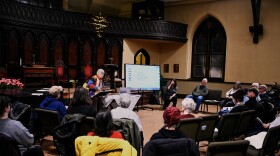Isabel Schumacher had applied for hundreds of jobs, to no avail. She didn't even land an interview. She grew disillusioned that finding a job was going to be nearly impossible.
Schumacher, who graduates this month from Connecticut College, had initially searched for government and data science jobs, reflecting her double major. But she scratched government roles after President Trump’s election, forecasting a federal jobs shakeup in Washington that would be difficult to navigate.
She narrowed in on data science jobs and started networking with professionals. In May, Schumacher received an offer as a financial analyst at Argus Information and Advisory Services, a TransUnion subsidiary.
“To have a salary and the reassurance of a job is certainly a weight off my shoulders,” she said.
In Connecticut and beyond, graduating seniors like Schumacher may have a more challenging journey landing jobs. The graduating class of 2025 once had bright hiring prospects. Then came federal hiring freezes and a wave of tariffs that have sparked economic uncertainty nationwide.
In recent months, employers have cooled their hiring expectations for graduates. Today, employers expect to hire about the same number of 2025 grads as last year’s graduating class – that's down from last fall’s projection of a 7.3% increase, according to the National Association of Colleges and Employers.
Students who prefer to go straight into the workforce will need more patience and flexibility when searching for their first full-time jobs, said Kelly Kennedy, the director of transformative learning and career education at the University of Connecticut School of Business.
“It's just gonna take longer. My advice to them is to be patient. Keep going and be patient,” Kennedy said.
Hiring slowdowns in private sector
Federal cuts pushed by the Department of Government Efficiency have caused a sharp decline in federal job applications. Handshake, a college job search platform, saw a 40% year-over-year drop in federal job applications from graduating seniors, according to a Wall Street Journal report.
In the private sector, businesses that rely on government funds, like consulting firms and government contractors, have cut down on staff and slowed hiring.
Deloitte, a multinational consulting firm, announced in April plans to lay off employees, as revenue from government contracts continues to stall. Earlier this month, PwC, an accounting and consulting firm, laid off 1,500 employees, 2% of its U.S. workforce, citing historically low employee turnover.
After seeing mass layoffs of federal employees, Alexa Molina, who’s graduating from the University of Connecticut this month, said she needed to pivot her career trajectory.
Molina, a Norwalk native, initially wanted to earn a master's in public affairs and go into government work.
“I feel like we’re already in a recession,” she said of the economy and broader economic uncertainty, especially affecting laid-off federal workers.
After applying for dozens of internships and jobs and hearing nothing back, Molina decided to pursue a master's in social work at the University of Connecticut this fall.
Choosing grad school or law school
A growing number of grads have decided to postpone their careers for post-undergraduate studies.
Applications to law schools across the U.S. are up more than 20%, according to the Law School Admission Council, a not-for-profit organization. Master's degree applications have also ticked up, with more than 70% of master of accounting programs reporting an increase in applications in 2024, according to a study conducted by the Graduate Management Admission Council.
Kennedy, with UConn, says students who advocate for themselves and understand their mission in the workplace will have an easier time finding employment. She added that Generation Z often has too high expectations for their first job, like six-figure salaries and generous paid time off – things that are hard to attain in a worker’s first professional role.
“Work is not a dream job, it’s a place where you can find meaning, but you have to understand what that is,” Kennedy said.
Hunter Yocum, a senior at Quinnipiac University who is graduating in the winter, was still in search of a summer software engineering internship.
Yocum, 28, enrolled in Quinnipiac’s School of Computing and Engineering after serving in the Air Force for six years, gaining leadership experience.
Yocum, a Shelton native, has struggled to find a job, despite applying to a dozen roles.
“I thought coming from the military with my experience … people would be in awe of my resume and cover letter, and I’d get an internship right away,” he said.
Still, Yocum remains optimistic that he’ll find a role in software engineering, knowing it might take extra time.





